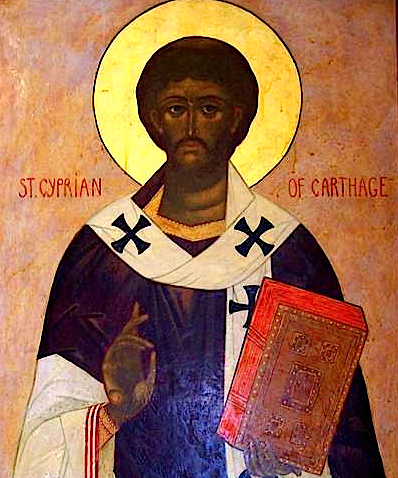How To Make Harissa Chicken Tagine
Today we are feasting with… Saint Cyprian.

To celebrate this feast day, we are making Harrisa Chicken Tagine, a traditional North African stew, made in a special earthenware pot. For this dish we’ve incorporated a spicy harissa sauce, made with dried chili peppers and other aromatic spices. It gives this dish a truly flavorful and authentic appeal.
The Life of Saint Cyprian
Cyprian was born in North Africa to wealthy pagan parents. He was educated in law, and well-versed in rhetoric. He practiced as a lawyer in Carthage before he was converted to Christianity about 246. In baptism, he found complete release from the sinful life he had previously led. Shortly after his baptism he was ordained a priest, and within two years was made Bishop of Carthage, despite his objections.
When the persecution of Decius broke out, in early 250, he went into hiding. Without his leadership, thousands of Christians rejected their faith or obtained certificates, by which they declared that they had sacrificed to the pagan gods.
When the persecution began to diminish, the confessors, those who had stood firm for their faith—reconciled the lapsed on easy terms, claiming that as “friends of Christ” they had the right of granting pardon, even more than did priests and bishops.
Cyprian returned to Carthage in early 251, and at a council of bishops, was able to regain his authority. The decision of the council was that, though no one should be totally excluded from penance, those who truly had sacrificed their faith should be readmitted only on their deathbeds, and those who had merely accepted certificates were to be readmitted after varying periods of penance. Three important principles of church discipline were thus established. First, the right and power to remit deadly sins lay in the hands of the church; second, the final authority in disciplinary matters rested with the bishops in council as vessel of the Holy Spirit; and third, unworthy members among the laity must be accepted in the New Israel of Christianity just as in the Old Israel of Judaism.
At the end of 256, a new persecution of Christians broke out under Emperor Valerian, and Pope Sixtus II was executed in Rome.
Cyprian was banished to Curubis, where he comforted his flock and his banished clergy. In a vision, Cyprian believed he saw his approaching fate.
Being recalled from exile, he was imprisoned, and a sentence of death by beheading was pronounced against him. Cyprian graciously received the sentence with the following words:
“Thanks be to God.”
Cyprian’s greatest desire was to die while in the act of preaching the faith of Christ. At his execution, he had the consolation of being surrounded by crowds of his faithful congregants.
Saint Cyprian, pray for us!
